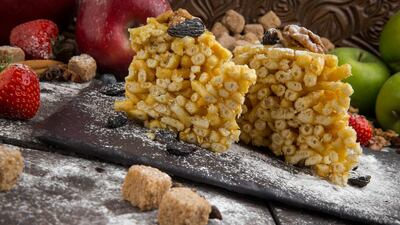There are new restaurants opening almost every day across the country, the vast majority of them offering something that already exists elsewhere, often presented in the form of the now ubiquitous “sharing concept”.
In the search of something different, foodies have begun to get a taste for Uzbek cuisine, and Eshak is giving the adventurous a taste of something new.
The menu at the City Walk venue offers Uzbek, Armenian and Georgian dishes commonly found along the Silk Road, but it is the Uzbek offerings that really hit home, presented in what is often referred to as a choyhona, from the Uzbek words choy, which translates as “tea”, and hona, which means “room”.
“Uzbek food is traditionally all about relaxing and enjoying food and company with friends,” says Mirzo Hafizov, Eshak’s director of operations. “While in the West people go to restaurants to dine and then they hang out in bars, in Uzbekistan people go to choyhona, which is basically a tea room.”
Eshak falls somewhere between a café and casual dining.
“The idea is about hospitality, welcoming the guest,” says Hafizov. “As you enter, there are fresh welcome nuts and dried fruits that we greet our guests with. We’d traditionally have these tea rooms by the rivers – there are lots in Uzbekistan – and sit there eating, drinking and relaxing.”
The restaurant has proved popular with locals.
“About 80 per cent of our customers are Emiratis, 10 per cent are from the former Soviet states, and 10 per cent are expats who live in the area, keen to try something new and different,” says Hafizov.
The most popular dishes include lamb manti (homemade dumplings stuffed with lamb, served with sour cream), tandyr samosa (crispy samosa stuffed with lamb and veal spices and cooked in the restaurant’s tandoor oven), and the traditional plov, Uzbekistan’s national dish.
“It’s the dish that makes Uzbek cuisine what it is,” says Hafizov of plov. “It’s both an everyday and an occasion dish. Whenever we have big weddings in Uzbekistan, this is the dish that we usually prepare.
“Largely consisting of rice, meat and fresh carrots, when you have big events like weddings, there can be between 500 and a 1,000 people, so a chef will prepare a plov in a huge pot called a kazan.”
One of the most significant things about the food here is that all the ingredients are shipped in from Uzbekistan. Hafizov says they are of noticeably better quality than those found in the UAE.
“The geography of Uzbekistan means there are lots of valleys surrounded by the mountains, and historically our neighbours, such as Kazakhstan, were more nomadic, whereas Uzbeks were more static, looking after the land and cultivating food,” he says. “So even now, we still produce some of the freshest organic fruit and vegetables. We fly them over to use fresh and even simple things, such as tomatoes or cucumbers, from Uzbekistan are far superior.”
Not only this, says Hafizov, but it also makes business sense as the ingredients are cheaper in his homeland.
As well as traditional Uzbek meals, the in;gredients are used to make other dishes, such as chak-chak (a Tatar dessert of pastry with honey) and khachapuri (a Georgian recipe of dough made with traditional Georgian cheese).
Outside the restaurant is a small stall selling some of the fresh ingredients flown in from Uzbekistan, creating a fresh-produce market in City Walk. With summer here, it is mostly selling spices, nuts and dried fruits, but come winter, there will be vegetables and fruit, most notably Uzbek melons.
As people in the UAE become even more open to new foods and seek out organic ingredients more regularly, this could prove to be a popular venue for local foodies. At a time when competition among restaurants is greater than ever, innovations like this could become more regular occurrences.
“Yes, the volume of restaurant openings is high in the city and you see the trends with lot of similar things opening all the time,” says Hafizov. “But this is something that nobody else has in town.”
artslife@thenational.ae

